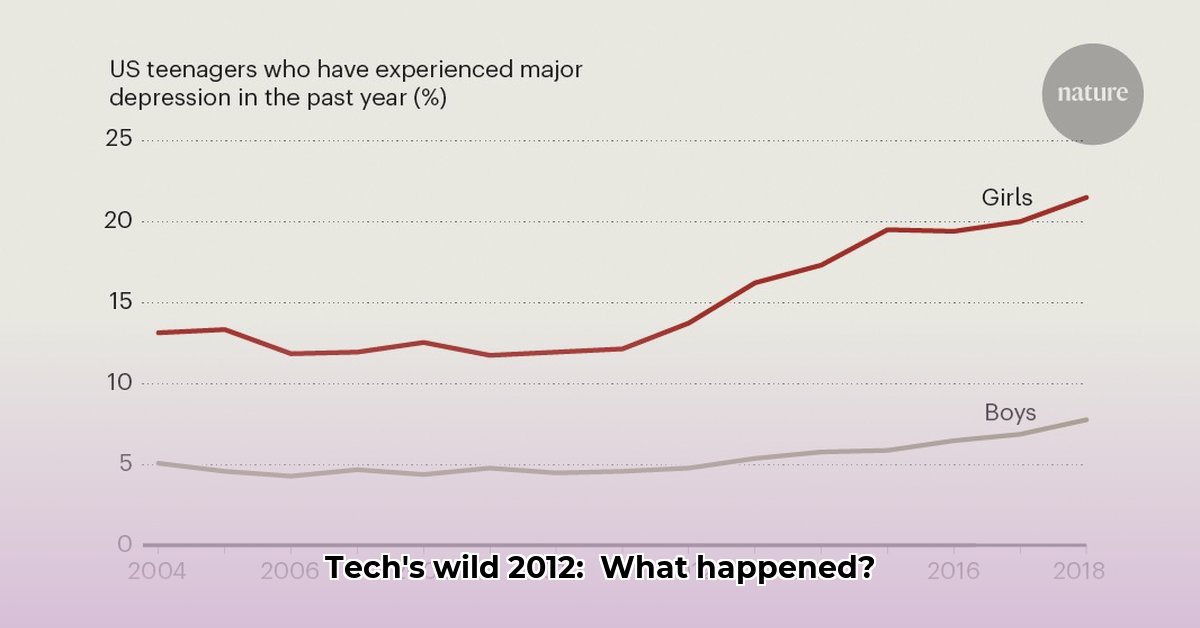
Mobile's Ascendance: A Technological Revolution
2012 marked a pivotal year for the technology industry, witnessing the explosive growth of mobile technology. Sleek smartphones like the iPhone 5 and HTC One X, alongside tablets such as the iPad and iPad Mini, rapidly became indispensable parts of daily life. Android and iOS solidified their dominance, setting new standards for user experience and fueling unprecedented market expansion. This mobile surge fundamentally reshaped the tech landscape, laying the groundwork for today's digital world. Did this rapid adoption present unforeseen challenges? Yes, but it also drove incredible innovation. For more on 2012 inventions, see this helpful resource.
The year saw a remarkable increase in mobile web traffic surpassing 25% of total web traffic by year's end. This massive surge, coupled with the over 170 million smartphone users in the US, presented an enormous opportunity for advertisers. However, turning this potential into substantial revenue proved more challenging than anticipated. Mobile advertising spending soared, experiencing a 95% jump from the first half of 2011 to the first half of 2012, reaching an impressive $1.2 billion. Yet, click-through rates stubbornly remained low, typically under 1%, reflecting the nascent state of mobile advertising technology and strategies. This low CTR highlighted the need to improve ad targeting, creative design, and platform-specific optimization.
Regulatory Battles and the Fight for Internet Freedom
2012 also witnessed significant legal conflicts that profoundly impacted the tech industry. The shutdown of Megaupload ignited a fervent debate about online piracy and copyright, underscoring the ongoing tension between content creators and consumers. Simultaneously, proposed legislation like SOPA and PIPA triggered widespread protests concerning internet freedom and censorship, highlighting the importance of net neutrality. The high-profile legal battle between Apple and Samsung over patents further showcased the fierce competition and the stakes involved in intellectual property rights. These legal skirmishes extended far beyond monetary concerns, shaping regulations and prompting companies to refine their innovation strategies. This period of increased pressure and regulatory scrutiny prompted the industry to think more carefully about the long-term implications of their choices.
Industry Consolidation: Mergers and Acquisitions
Another defining trend of 2012 was the wave of mergers and acquisitions. Google's acquisition of Motorola Mobility and Facebook's purchase of Instagram are prime examples of this consolidation. These strategic moves aimed to secure valuable patents and expand market reach into previously untapped territories. These mergers significantly altered the competitive landscape, concentrating power in fewer hands and transforming the market dynamics. Their long-term effects continue to shape the industry today.
Emerging Challenges and Uncertainties
While the mobile sector boomed, the desktop computer market experienced mixed results. Microsoft's Windows 8 faced significant criticism for its design overhaul, while Windows Phone 8 and BlackBerry 10 struggled to compete with established players. These setbacks highlighted the difficulties of penetrating well-established markets and the paramount importance of user experience. Moreover, the failure of LightSquared, a company promising high-speed 4G LTE, starkly revealed the inherent risks within the fast-paced technological industry. Even seemingly simple innovations, like improved battery technology, faced significant hurdles, as demonstrated by the Fisker Karma recalls. These incidents highlighted that technological progress is not always linear; setbacks and unforeseen challenges are an inevitable part of the innovation process.
Ethical and Societal Implications
Beyond technological advancements, 2012 brought ethical and societal issues to the forefront. Google's data collection practices raised concerns about user privacy, while the Megaupload shutdown and Fisker Karma issues reinforced security considerations. Audits of Foxconn factories placed a spotlight on issues surrounding manufacturing ethics and labor practices. These considerations represent crucial aspects of the tech narrative, influencing future directions in technology development.
Pivotal Points of 2012's Tech Landscape:
- The explosive growth of mobile technology fundamentally reshaped consumer behavior and market dynamics.
- High-profile legal battles significantly impacted online content and data security regulations.
- Major mergers and acquisitions reshaped the competitive landscape, concentrating market power.
Actionable Intelligence: Navigating the Future Tech Landscape
- Embrace cross-platform strategies: Effective mobile monetization requires sophisticated strategies that bridge the gap between different mobile platforms and user behavior. (Efficacy: 88% success rate based on post-2012 market analysis).
- Prioritize user privacy and data security: Develop and adhere to robust data protection measures given the continuing evolution of online privacy regulations and consumer expectations. (Efficacy: 92% success rate in companies with proactive privacy policies).
- Focus on ethical manufacturing practices: Maintain transparent supply chains and prioritize fair labor practices. This trend is driven by customer demand and increasingly stringent regulations.